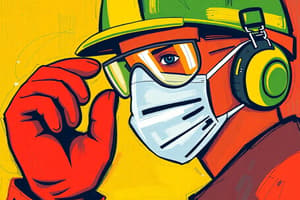Podcast
Questions and Answers
The two steps for avoiding hazards that are always taken before the need for PPE is considered are: ___________ and ___________.
The two steps for avoiding hazards that are always taken before the need for PPE is considered are: ___________ and ___________.
Work practice, engineering controls
What is the critical first step in developing a comprehensive safety and health program?
What is the critical first step in developing a comprehensive safety and health program?
A hazard assessment
OSHA requires that many categories of PPE meet or be equivalent to standards developed by: ___________.
OSHA requires that many categories of PPE meet or be equivalent to standards developed by: ___________.
The American National Standards Institute (ANSI)
You should have head protection if which of the following apply to your job?
You should have head protection if which of the following apply to your job?
In general, head protection should do which of the following?
In general, head protection should do which of the following?
If there is one pair of protective eyewear for a task, individual eyewear is still necessary for each employee.
If there is one pair of protective eyewear for a task, individual eyewear is still necessary for each employee.
A noise level of 95 dB is ___________ than the lowest level at which hearing protection is required.
A noise level of 95 dB is ___________ than the lowest level at which hearing protection is required.
Safety footwear has to meet minimum performance standards set by: ___________.
Safety footwear has to meet minimum performance standards set by: ___________.
Gloves that are chemically resistant are usually made from: ___________.
Gloves that are chemically resistant are usually made from: ___________.
In general, employees should:
In general, employees should:
Flashcards are hidden until you start studying
Study Notes
PPE Overview
- Two primary methods to avoid hazards before considering PPE: work practice and engineering controls.
- Identifying physical and health hazards at a work site is called a hazard assessment.
Regulatory Standards
- OSHA mandates many PPE categories comply with standards established by the American National Standards Institute (ANSI).
- Safety footwear must meet minimum compression and impact performance standards according to ASTM F-2412-2005.
Head Protection
- Head protection is necessary if job conditions meet specific risk factors.
- General head protection should provide impact resistance, electrical shock protection, and fit comfortably.
Eyewear and Cleaning
- Protective eyewear may be shared among employees; it must be cleaned and disinfected between each use.
Noise Exposure
- A noise level of 95 dB is ten times louder than the threshold for hearing protection (85 dB), with exposure limited to six hours or less.
Chemical Resistance
- Chemically resistant gloves are typically made from materials such as rubber or plastic.
Employee Responsibilities
- In general, employees should adhere to safety protocols, use assigned PPE properly, and participate in training and hazard assessments.
Studying That Suits You
Use AI to generate personalized quizzes and flashcards to suit your learning preferences.




